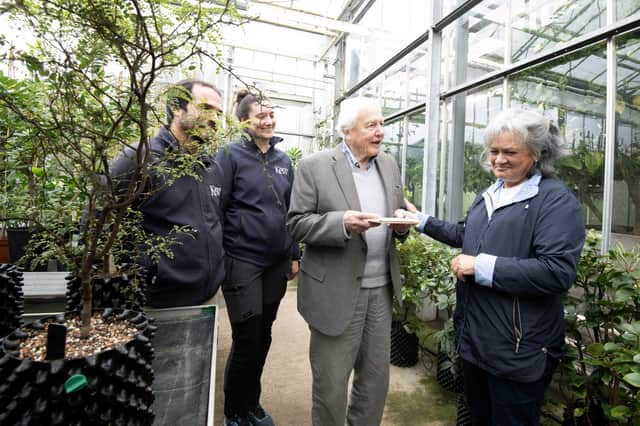Sir David Attenborough finds safe home for precious Easter Island seeds at Kew Gardens


In the presence of Richard Deverell, Director of the Royal Botanic Gardens, Kew, and Richard Barley MBE, Director of Gardens at RBG Kew, 31 seeds of Sophora toromiro were presented to Sir David by his friend Dr Sonia Haoa Cardinalli, a Rapa Nui archaeologist and author of Cultural and Environmental Changes of Rapa Nui. The famed naturalist then donated the seeds to his ‘friends at Kew’, believing they will find a safe home among the living collections tended to at the historic botanical garden.
Sophora toromiro, commonly known as the toromiro tree, is a plant from the legume family that is endemic to the remote Pacific island of Rapa Nui. It is particularly recognised for its striking rose-coloured wood, which has been historically used for intricate wood carvings.
Advertisement
Hide AdAdvertisement
Hide AdUnfortunately, the plant is classified as Extinct in the Wild on the International Union for Conservation of Nature (IUCN) Red List of Threatened Species. The plant’s decline has been attributed human activities, such as deforestation and the introduction of agricultural animals to the island in the 18th and 19th centuries, with its extinction in the wild sealed in the 1960s.
When Norwegian ethnographer and adventurer Thor Heyerdahl visited the island in the 1950s, he found only one surviving toromiro tree. He collected seeds that were subsequently sent to Gothenburg Botanical Garden in Sweden, with specimens later cultivated at a botanical garden in Menton, Southern France.
Richard Barley MBE, Director of Gardens at RBG Kew, said: ‘It has been a great privilege to accept this collection of Sophora toromiro seeds from Sir David Attenborough, a life-long advocate for nature and cherished friend of the Royal Botanic Gardens, Kew.
‘Faced with the dual crises of climate change and biodiversity loss, botanical gardens across the world are on the frontline of the battle to protect our natural world, and as the shepherds of the world’s most biodiverse collection of living plants, RBG Kew will be a perfect new home for the seeds.’
Advertisement
Hide AdAdvertisement
Hide AdBefore the seeds could be donated to Kew they were inspected and given the green light by Joanna Bates, Head of Plant Health and Quarantine at RBG Kew. The movement of plant material in and out of the Gardens is strictly monitored and anything arriving in the UK from abroad must have a valid phytosanitary certificate – a document certifying the plant material is free of pests and disease and meets all the legal requirements to cross UK borders.
RBG Kew’s expert horticulturists will now set aside a number of the seeds to germinate and grow for display in the Temperate House, the world’s biggest surviving Victorian glasshouse. Some of the seeds may also be deposited in the Millennium Seed Bank at Wakehurst, RBG Kew’s wild botanic garden in Sussex, where they will be dried, frozen and preserved for conservation in underground vaults.
ON THE EDGE OF EXTINCTION
During his visit to the Tropical Nurseries, Sir David was shown some of the rare and threatened species being looked after at Kew, including Aloe bellatula and Aloe albiflora, two critically endangered species of aloe last seen in the wild in 1976 and 1955, respectively. Another highlight included Aloe suzannae that was previously thought extinct until Malagasy botanists from RBG Kew rediscovered a small population.
Paul Rees, Nursery Manager, gave a short presentation to the visiting group, explaining why human activities and poaching, in particular, pose such a grave threat to wild plant life. As an example, he showcased Conophytum chrisocruxum, a critically endangered species known from a single ridge where its population has declined by 80% since 2019, due in part because of poaching.
Advertisement
Hide AdAdvertisement
Hide AdSome of the other plants on display included Viscum minimum on its host species Euphorbia polygona, the smallest mistletoe species known to science, and Passiflora condorita, a flowering plant known from a single location that is yet to flower in cultivation and whose flower is only known from a dried specimen and illustration.
And though that last surviving specimen on Rapa Nui has long vanished, there is hope on the horizon: toromiro plants still exist in cultivation in botanic gardens across the globe, including toromiro hybrids grown at Kew Gardens. Attempts to reintroduce the plant to Rapa Nui have also seen some degree of success with a number of specimens now thriving on the island, including some in the garden of Dr Haoa Cardinali.Alex Baribeau, Tropical Nursery Supervisor, said: ‘Getting to meet Sir David and accepting the Sophora toromiro seeds from him has been something of a dream come true. Many of us here at Kew grew up watching his nature documentaries and have been inspired by his love for nature. ‘It’s an honour and a privilege to accept these seeds and we will make sure they are well looked after. Now I just have to try to grow them, no pressure.’Sir David was also shown the Hawaiian Brighamia insignis or vulcan palm, a critically endangered plant with only one known specimen recorded in the wild in 2014. The plant’s only known pollinator is believed to be a type of extinct hawk moth and it now relies on humans for manual pollination.
Comment Guidelines
National World encourages reader discussion on our stories. User feedback, insights and back-and-forth exchanges add a rich layer of context to reporting. Please review our Community Guidelines before commenting.